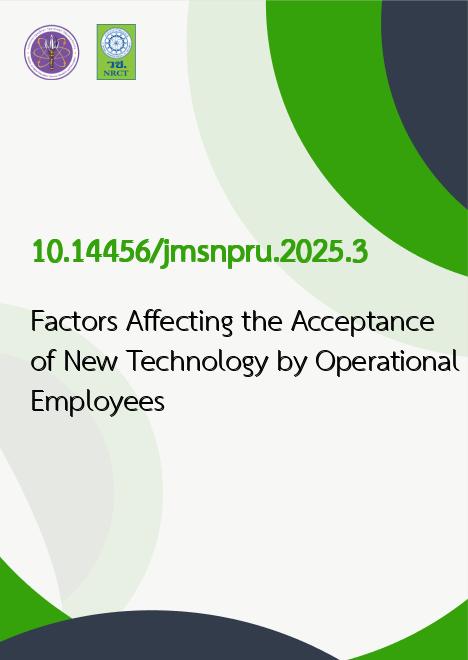
|
Factors Affecting the Acceptance of New Technology by Operational Employees |
|---|---|
| รหัสดีโอไอ | |
| Creator | Vutti Watcharodomprasert |
| Title | Factors Affecting the Acceptance of New Technology by Operational Employees |
| Publisher | Faculty of Management Science Nakhon Pathom Rajabhat University. |
| Publication Year | 2568 |
| Journal Title | Journal of Management Science Nakhon Pathom Rajabhat University |
| Journal Vol. | 12 |
| Journal No. | 1 |
| Page no. | 23-37 |
| Keyword | New Technology Acceptance, Technological Knowledge and Skills, Operational Employees |
| URL Website | https://so03.tci-thaijo.org/index.php/JMSNPRU/issue/view/18024 |
| Website title | https://so03.tci-thaijo.org/index.php/JMSNPRU/index |
| ISSN | 2392-5817 |
| Abstract | This study aimed to: 1) analyze the relationship between technological knowledge and skills, managerial support, organizational readiness for change, social influence, job satisfaction, and acceptance of new technology among operational employees; and 2) investigate the factors influencing the acceptance of new technology among operational employees. The study focused on employees working in medium- and large-sized organizations located in Bangkok. The research population comprised the working-age population residing in Bangkok, totaling 3,524,378 people, excluding Generation Alpha and Baby Boomers. Using a confidence level of 95%, a sample size of 385 participants was determined. The sample was randomly selected from departments adopting new technologies through simple random sampling conducted via online and offline channels. Data analysis was performed using statistical software with the following techniques:Descriptive statistics, including mean, standard deviation, and frequency distribution. Correlation analysis to examine the relationship between factors influencing the acceptance of new technology among operational employees. Multiple regression analysis to identify factors significantly impacting the acceptance of new technology among operational employees. 1) The results indicated that all six independent variables were related to the acceptance of new technology among operational employees. 2) However, technological knowledge and skills, along with job satisfaction, were found to have a significant influence on the acceptance of new technology. Other factors, although correlated, did not exhibit a significant influence, possibly due to internal organizational factors such as a lack of motivation, insufficient support tailored to employees' needs, or unclear communication during change initiatives. Open-ended questions revealed additional factors perceived by the participants, including organizational culture, technological readiness, prior experience, involvement in decision-making, financial incentives, trust in leadership, and the impact on security and privacy, which could influence the acceptance of new technology among operational employees |